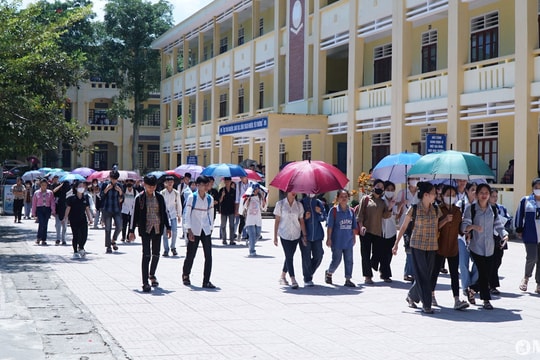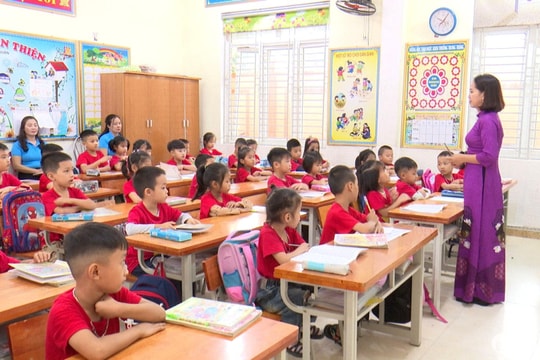Free tuition - a decision for the future
The Politburo's decision to exempt tuition fees for students is a positive sign, showing that the country's economy has made great strides, worthy of being recorded in the history of the education sector and of the whole society, affirming that education and training is the top national policy in the spirit of Resolution 2 of the 8th Central Committee.
Every citizen has the right to access education.
Tuition waiverso that all citizens have access to education without financial barriers, helping disadvantaged families reduce social inequality and expand learning opportunities for everyone. Special attention is paid to human resources, creating a source of citizens with the capacity to contribute to society, demonstrating a humane vision in investing in the future of society. The State focuses on social welfare, improving the quality of life for people, helping to encourage investment in education as a fundamental factor to develop high-quality human resources, meeting the needs of sustainable development of society.

Education is no longer a privilege of the rich, but becomes a right for all classes in society. Students focus on learning without worrying about financial problems, reducing the burden on families, creating motivation to develop personal capacity without being affected by external factors. When children are fully educated, society can also reduce injustice and improve the intellectual level of the people, create a fair learning environment, reduce the gap between rich and poor and promote the sustainable development of the country.
Along with Circular 29 on strengthening the management of extra teaching and learning, the exemption of tuition fees helps parents reduce the financial burden significantly compared to before, especially for families in difficult circumstances with many children. Families with conditions can send their children to prestigious schools, attend supplementary classes, study abroad in developed countries with advanced education. That is only a minority, not all families have such conditions. In fact, in recent years, the number of students dropping out of school has been for many different reasons, most of which are due to financial pressure. Reducing the financial burden is the first step to changing the students' circumstances and building a better future. When parents no longer worry about tuition fees, they can focus more on investing in other learning needs for their children such as books, learning equipment or skills courses. This will create equality in access to education and help students have the opportunity to develop comprehensively. Students do not feel self-conscious when teachers remind them to pay tuition fees, and parents do not have to scramble to pay tuition fees for their children.
When students do not have to worry about the cost of education, they can focus more on learning and developing skills, students from disadvantaged families will have equal learning opportunities like other students, thereby helping to reduce social polarization. Talented but financially disadvantaged students do not miss out on learning and development opportunities, reduce psychological stress, improve learning spirit, reduce anxiety and increase knowledge absorption. Families can spend money to invest in additional courses, vocational training or other development opportunities for their children, creating a positive spiral to promote the future. Free tuition helps create a fairer society, where every individual has the opportunity to enjoy an education recognized in the 2019 Education Law. This can reduce the rich-poor polarization, help people from poor families have the opportunity to rise up, and reduce social discrimination. When citizens have access to education without financial barriers, society will have a diverse and quality human resource with a high level of education that will promote economic development through training a more qualified, creative and efficient workforce.
The great policy full of humanity, meaning and practicality of the Party and State received the consensus of all classes in society. Schools, teachers and students were extremely excited and happy when this policy was implemented. All children are the poorest, therefore, need to access free education. Education is provided free of charge thanks to the tax-paying efforts of parents, so that "no one is left behind".
Tuition-free, not free education

However, the concept should not be confused, free tuition is not free education. Tuition is exempted but the school still maintains many fees, both reasonable and unreasonable. In fact, in recent years, there have been educational institutions where students have to pay many fees for drinking water, sanitation, learning equipment, life skills training, English enrichment, etiquette... hundreds of things that fall on the heads of parents. Children are exempt from tuition, but many other fees at school are still not exempted, so the worry is still there. In addition to the few million, a few hundred thousand dong that are exempted, parents still have to pay millions, even many millions more to serve the education of their children at school.
Exemption from tuition fees will face certain difficulties for schools. Tuition fees are often one of the main sources of income for schools. Schools must find alternative sources of funding to maintain operations, tuition fees cover teachers' salaries, purchase facilities and organize teaching activities. Without sufficient budget, schools may face difficulties in maintaining teaching quality, such as a lack of teachers, learning materials, facilities or extracurricular activities to support students. Exemption from tuition fees makes many units not have enough resources to invest in renovating, upgrading facilities, building new classrooms or investing in educational technology. Exemption from tuition fees can create great pressure on administrators to ensure reasonable spending and seek effective funding options from sources outside the state budget or social organizations.
The country is developing, its position and prestige are increasingly enhanced, it is time for the state to invest more adequately in facilities, learning equipment, and training of teachers to meet learning needs, improve the quality of education and help students access more modern teaching methods. It is thought that, in addition to free tuition, there should be more strong investment policies in science and technology in education, more investment in school infrastructure, and development of scholarship programs so that students have better learning opportunities, especially in remote areas, ethnic minority areas, and island border areas. Encourage well-off families, philanthropists, and sponsors to voluntarily contribute... instead of "leveling" for families.
In the joy of free tuition, Vietnamese education is expected to aim higher and further than every child "every day at school is a happy day". This means that students only need to bring their school bags and water bottles to go to class, because the right to education is protected by the whole society. They will study in an environment where they do not have to worry about the cost of education or lack of learning conditions. A young generation that is not only good at knowledge but also strong in spirit and morality is formed, contributing to building a sustainable and prosperous society.


.jpg)



